Military weapons seized in Gulf of Oman
Fox News chief national security correspondent Jennifer Griffin reports on Lloyd Austin’s discussion with military partners about Russian ties on ‘Special Report.’
FIRST ON FOX - Amid the International Atomic Energy Agency’s disclosure this week that the Islamic Republic of Iran accumulated near weapons-grade enriched uranium for its alleged nuclear weapon program, Fox News Digital has learned that Iran has allegedly secured secret deals with Russia to guarantee deliveries of uranium.
In what could be a major setback to a new Iran nuclear deal, foreign intelligence sources speaking on the condition of anonymity, and who are familiar with the negotiations between Moscow and Tehran over Iran’s reported illegal nuclear weapons work, told Fox News Digital that Russian President Vladimir Putin agreed to return enriched uranium that it received from Iran if a prospective atomic deal collapses. The State Department would neither confirm nor deny the reports.
The State Department spokesperson told Fox News Digital, "We will not comment on purported secret intelligence reports, but in any event the JCPOA has not been on the agenda for months." A spokesperson for the National Security Council deferred comment to the State Department.
One major component of the effort by the U.S and other world powers to revive the Joint Comprehensive Plan of Action (JCPOA), the formal name of the Iran nuclear deal, is for Russia to warehouse Tehran's enriched uranium. The rationale for Russia storing the uranium is to prevent the regime from using the material to construct an atomic bomb.
The foreign intelligence sources claim, "As part of the agreement between the two countries, Russia has undertaken to return all the enriched uranium to Iran as quickly as possible, if, for any reason, the U.S. withdraws from the agreement."
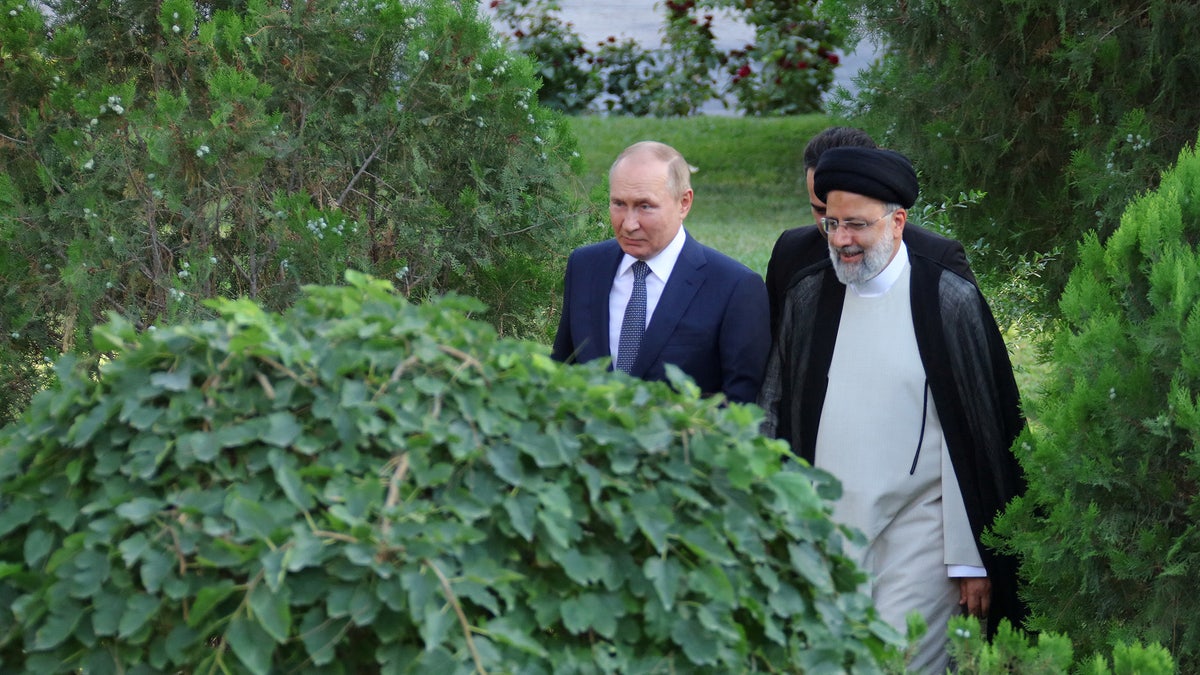
Vladimir Putin meets with Iranian President Ebrahim Raisi in Tehran, Iran, July 19, 2022. (President Website/West Asia News Agency/Handout via Reuters)
"It would make sense to me that they would agree to this type of side deal," Rebekah Koffler, a former analyst at the U.S. Defense Intelligence Agency, said. Koffler noted that, "Based on my knowledge of Russian doctrine and state tradecraft, the Russians are trying to play both sides. On the one side, they do not want Iran to have a nuclear weapon. On the other hand, they do want assistance from Iran for Ukraine."
Koffler, an expert on Russian strongman Vladimir Putin, added, "Russia benefits from being a party to the JCPOA. Russia's tactic is to drag things on and play both sides. That gives Putin leverage over both sides but also allows him to be perceived as a deal-maker. Russia is signaling that the U.S. is dependent on Russia."
She concluded that, "The Russians are trying to signal to the Iranians that they will help them out like they did with Iran's civilian nuclear program. On the other hand, they might want to put pressure on the U.S. to do the deal. It is just part of Putin's standard playbook to try to game his opponents."
Former U.S. President Donald Trump withdrew from the Iran nuclear deal in 2018 because he and his administration believed the JCPOA failed to stop Iran from building a nuclear bomb. Trump’s White House also argued that the Iran nuclear pact did not crack down on the theocratic state’s terrorism and restrict its missile program.
Iran’s regime wants an ironclad agreement from the Biden administration that it and future U.S. administrations will not pull the plug on a new JCPOA. The White House said it cannot guarantee that a new administration will not walk away from the controversial deal.
On Tuesday, a top U.S. Defense Department official told Congress that Iran’s regime could develop enough fissile material for a nuclear bomb in a mere 12 days.
When asked about the secret deals between Iran and Russia over the shipments of enriched uranium, Mojtaba Babaei, a spokesperson for the Iran mission at the United Nations, told Fox News Digital, "There's no information about the claim."
He added, "Massimo Aparo, deputy director general and head of the Department of Safeguards, visited Iran last week and checked the alleged enrichment rate. Based on Iran's assessment, the alleged enrichment percentage between Iran and the IAEA is resolved. Due to the IAEA report being prepared before his trip, his trip's results aren't in it and hopefully the IAEA director general will mention it in his oral report to the board of governors."
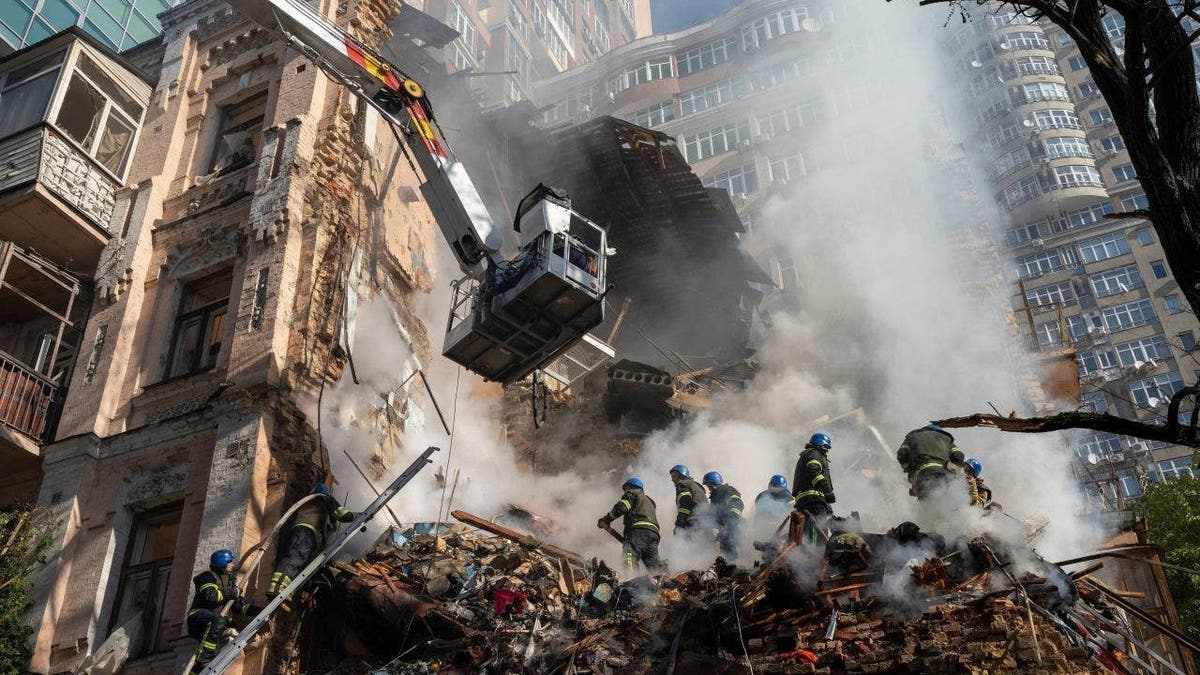
Firefighters work after a drone attack on buildings in Kyiv, Ukraine, Oct. 17, 2022. Iran has been supplying drones to Russia that have killed Ukrainian civilians and caused major damage to civilian infrastructure. (AP Photo/Roman Hrytsyna, File)
IRAN HOLDS TOP MILITARY DRILLS IN MAJOR OIL WATERWAY IN 'WAR BEFORE THE WAR'
When questioned about the Islamic Republic building a nuclear weapon, Babaei said, "Iran has no plans to make nuclear weapons because its military doctrine prohibits the use of weapons of mass destruction in any form."
Experts on Iran’s alleged atomic weapons program have long sharply disagreed with the Islamic Republic’s denials and the growing cooperation between Russia and Iran has exacerbated the conflict over Tehran’s nuclear program.
Jason Brodsky, the policy director of the U.S.-based United Against a Nuclear Iran (UANI), told Fox News Digital that the "reported side deals between Iran and Russia on the nuclear file just demonstrate the risks of depending on Moscow as a participant or guarantor in a JCPOA-like arrangement. The geopolitical context has fundamentally shifted with its invasion of Ukraine."
He added, "P5+1 [China, France, Russia, Britain, U.S. and Germany] under these conditions of great power conflict is not a viable diplomatic platform. Iran has leverage over Russia in 2023 that it did not have in 2015 with its supply of arms. It’s in this dynamic that the Kremlin can’t be trusted. The JCPOA of 2015 has no future. It’s time to declare it dead, invoke the snapback sanctions mechanism, and pivot to a deterrence strategy as the diplomatic track has run aground."
Iran’s regime is supplying Russia with sophisticated lethal drone technology in its war against Ukraine.
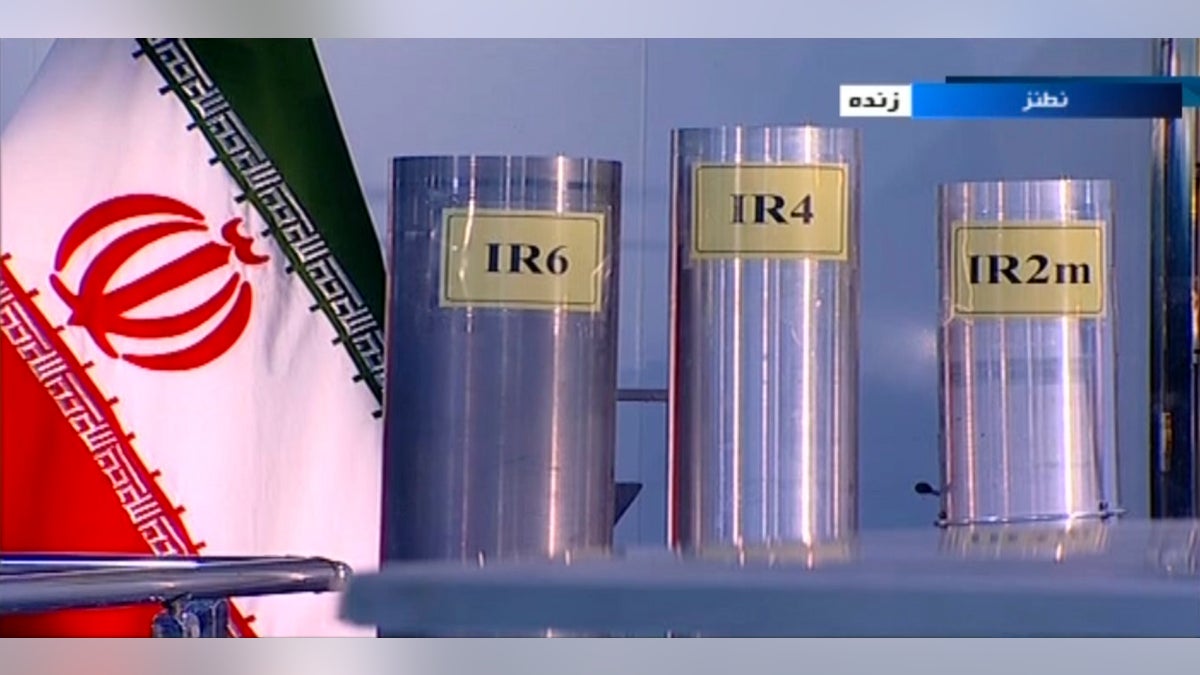
Three versions of domestically built centrifuges are shown in a live TV program from Natanz, an Iranian uranium enrichment plant, in Iran, on June 6, 2018. (IRIB via AP, File)
The uranium enrichment deal was hammered out during Putin’s visit to Iran in July 2022. The ostensible quid pro quo arrangement between the authoritarian regimes further solidified their growing alliance.
The Intelligence officials said, "President Putin, who made a special trip to Iran to pursue weapons deals between the two countries, agreed to approve the request, apparently due to his interest in compensating the Iranians for their assistance." Talks about the secret deals also unfolded between Moscow and Tehran during August 2022, when Iran’s regime was providing a shot into the arm of Putin’s war machinery in Ukraine.
According to the intelligence officials, the Iranians seized the opportunity during Putin’s desperate need for drones and demanded a "nuclear guarantee" that would enable Iran "to quickly restore its uranium stock to the quantity and enrichment levels it had maintained before the resumption of the agreement."
The attempt to circumvent the U.S. and the other Western powers would gut the entire purpose of the Iran nuclear deal, argued the intelligence officials, who noted, "This would significantly undermine U.S. interests and would give Russia de facto control over the nuclear agreement in the present and future."
The Biden administration remains deeply wedded to the Iran nuclear deal, which would provide Tehran with up to $275 billion in financial benefits during the first year of the agreement and a startling $1 trillion by 2030, according to one U.S. think tank study.
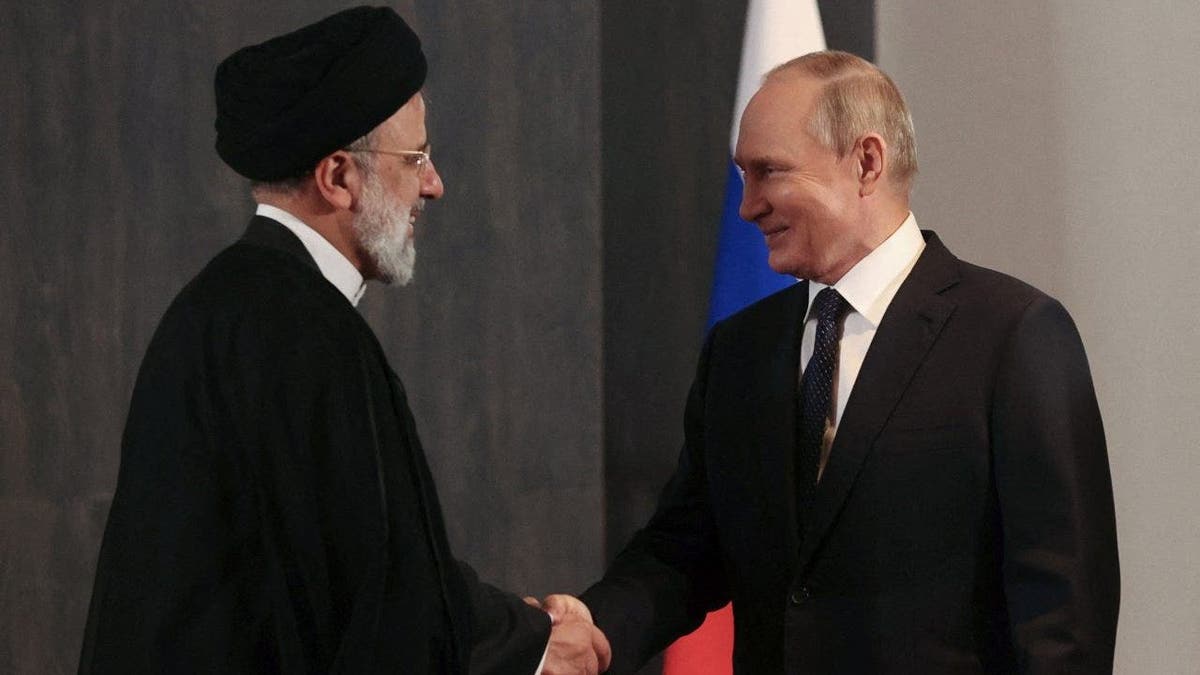
Russian President Vladimir Putin shakes hands with Iranian President Ebrahim Raisi during a meeting in Samarkand, Uzbekistan Sept. 15, 2022. (Sputnik/Alexandr Demyanchuk/Pool via Reuters)
IRAN BELIEVED TO HOUSE SUSPECTED NEW AL-QAEDA LEADER: UN REPORT
In an unusual move, the Biden administration is following a more dovish approach than its Western European counterparts who want Iran to be censured at Monday's IAEA meeting for enriching near weapons-grade uranium. The Islamic Republic has produced weapon-grade material of 60% since 2021, but new material was discovered showing 84% purity. Weapons-grade uranium starts at around 90%.
Michael Singh, an expert on Iran’s nuclear program and the managing director for The Washington Institute for Near East Policy, urged the Biden administration and its allies in a late February article on the think tank’s website to "snap back sanctions" against Iran in response to Tehran’s near weapons-grade uranium enrichment
The 2015 JCPOA contains a penalty that allows for snapback sanctions and Singh argued that the sanctions would "bolster military deterrence, and plan for potential crisis scenarios."
The row over Iran’s illicit enrichment of weapons-grade uranium comes amid a Fox News Digital report that Tehran may be behind an assassination and terror target list focused on law enforcement agencies in Boston.
The U.S. government under both Democratic and Republican administrations has classified Iran’s regime as the worst state sponsor of international terrorism.
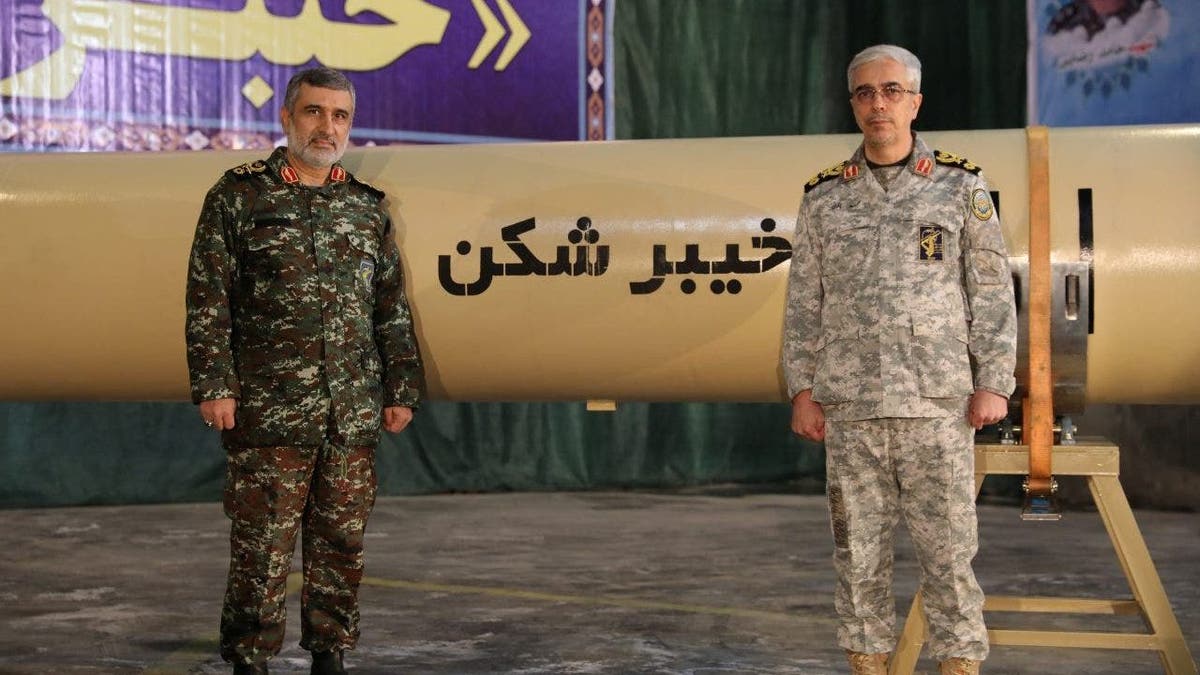
Iranian Armed Forces Chief of Staff Mohammad Bagheri and IRGC Aerospace Force Commander Amir Ali Hajizadeh during the unveiling of "Kheibarshekan" missile in Iran, Feb. 9, 2022. (West Asia News Agency/Handout via Reuters)
CLICK HERE TO GET THE FOX NEWS APP
Fox News Digital queries to Russia’s government and the IAEA were not immediately returned.
The IAEA’s Director General Grossi said on Saturday while in Tehran that he had "constructive" meetings and a settlement with Iran over its near weapons-grade enrichment of uranium was reached. Grossi met with the head of Iran’s atomic energy organization, Mohammad Eslami.
The IAEA board is scheduled to meet Monday in Vienna to consider the organization's latest report and could once again censor Iran for its actions.
THE Associated Press contributed to this report.

